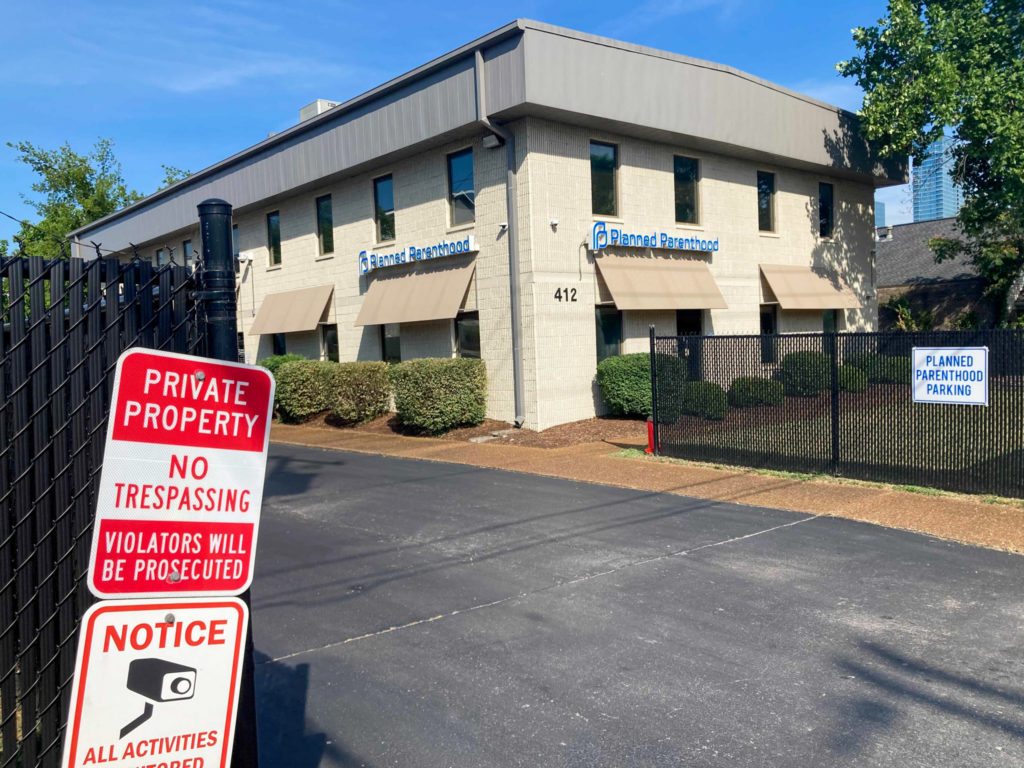
In 2014, the Ferguson protests catalyzed the country to discuss race, justice and police violence.
Nashville resident and pastor Scott Hord says around this time, he received a challenge: “The Lord gave me two words: ‘Engage abortion.’ ”
Since then Hord has been protesting against abortions in front of Nashville’s Planned Parenthood.
“I didn’t know the connection between racism and Planned Parenthood,” Hord says. “I didn’t know Margaret Sanger was a racist white woman that wanted brown-skinned and Black-skinned individuals to die.”
Hord is referring not to Black and brown people but to embryos and fetuses.
In 1946, Margaret Sanger wrote about the importance of giving Black parents a choice in how many children they had. She also believed in eugenics, which promotes selective gene breeding. This was a thought promoted also by Nazi Germany, and the Holocaust tested this theory on a large scale, although an NPR fact-check found that Sanger joined an anti-Nazi committee in 1939.
“One person doesn’t dictate the movement,” Healthy and Free Tennessee member Briana Perry says. “I think it’s used like, we shouldn’t get abortions, we shouldn’t think about comprehensive reproductive health care access because of this person. And I think it’s very intentional and the tool of white supremacy to focus on one person.”
Perry says abortion is just one piece of an overall framework that includes the right to have children on your own terms, to choose not to have children, and to raise children in healthy, supportive and sustainable communities.
“What happens with housing, jobs, public education are part of reproductive justice issues,” she explains. “It impacts a person’s reproductive choices and their autonomy, including in the decision to terminate a pregnancy, and that we need access to all those resources to live full lives.”
Linking embryos and fetuses to human rights
After 1973, anti-abortion activists were upset that the Supreme Court decided abortions were legal.
To gain broader support, they studied the civil rights and women’s rights movements to develop their tactics. During that time, the public was wary of religion, so they strategically strayed away from making it the central point of their argument.
More: 7 persistent claims about abortion, fact-checked
“That’s why they compare Roe to Dred Scott,” says Jennifer Holland, the author of Tiny You: A Western History of the Anti-Abortion Movement. “They’re like, ‘Dred Scott dehumanized Black people, and Roe dehumanizes fetuses’ — you know, they say ‘babies.’
Now, the anti-abortion movement often uses terms like “genocide” and “child survivors” to gain empathy.
“They can borrow from the civil rights movement. They can borrow from the history of the Holocaust and say, ‘We’re going to make America better because we’re giving more rights to more people,’ and … try to say you’re not actually taking rights away from anybody,” Holland says. “Other conservative movements aren’t able to sort of yoke those things together as well. But this movement does.”
Exacerbating a health crisis for Black women
Many conservatives, including Supreme Court Justice Clarence Thomas and Ben Carson, who are both Black, have spread misinformation about abortion being eugenics to get rid of Black people.
In Tennessee, Black women account for roughly half of all the state’s abortions. But some experts say this is because of limited access to health care and choices for birth control.
More: Here’s who currently gets abortions in Tennessee
This same group’s lives are more likely to be in danger when pregnant, because of systemic racism in the health field: non-Hispanic Black women who are 2.5 times more likely to die than non-Hispanic women.
Recent research from the University of Colorado shows abortion bans will only exacerbate the current health crisis.
On the day of the Supreme Court ruling overturning Roe v. Wade, a group of mostly white protesters outside the Planned Parenthood in Nashville held signs of Black children celebrating the lives they had “saved.” White and Black drivers honked horns and slowed down to celebrate.
More than half of Black Americans support abortion rights, according to Pew Research, and the split on pro- and anti-abortion rights is much tighter for white and Hispanic people.
Women are more likely to say abortion should be legal in all or most cases compared to men.

